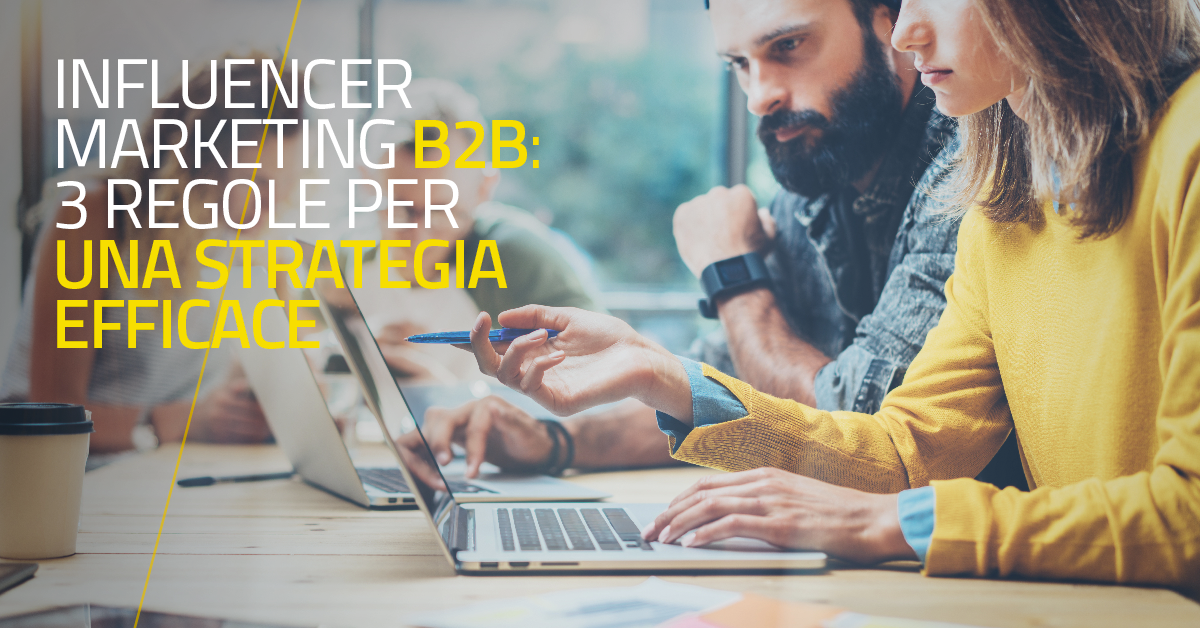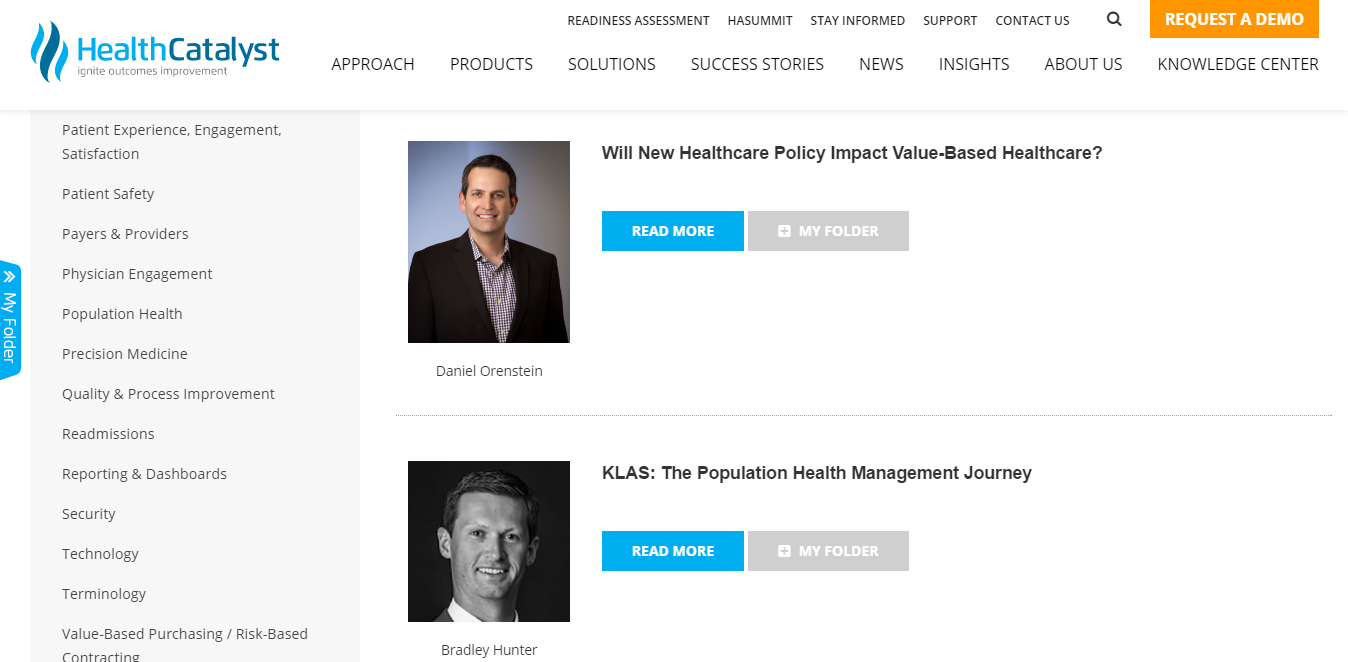Diciamo la verità, i contenuti B2B sono per la maggior parte noiosi. Secondo uno studio di Sirius Decisions, il 60-70% di questi addirittura non viene nemmeno letto; questo perché le aziende B2B risentono della mancanza di un approccio strategico e moderno al content marketing. In molti casi gli ebook, i whitepaper, i video e i blog post prodotti non si focalizzano sui bisogni, sui valori e sulle preoccupazioni dei singoli consumatori, e questo è il motivo per cui i contenuti B2B fanno fatica ad arrivare alle proprie target audience.
Cosa dovrebbero fare allora i Marketer B2B? Che cosa potrebbe aiutarli a rendere i loro contenuti più efficaci?
La chiave sta nell’Influencer Marketing. Ovvero nel coinvolgere esperti di settore e opinion leader influenti per produrre contenuti B2B al vostro posto.
Il 55% dei clienti B2B afferma di cercare fornitori/prodotti sui social media, mentre l’80% dei decision maker B2B preferisce avere maggiori informazioni da blog post invece che dall’advertising (fonte: Meltwater.com). Ne consegue che i Marketer B2B stanno comprendendo sempre di più la necessità di un Influencer Marketing strategico per aggiungere autorevolezza alle proprie campagne di content marketing.
Perché l’Influencer Marketing ha guadagnato l’attenzione dei Marketer B2B
Il customer journey di un cliente B2B generalmente è lungo e si compone di diversi touch point. Campagne di content marketing influenti e credibili possono contribuire a rendere i cicli di vendita più brevi. Costruendo relazioni con gli Influencer, i Marketer B2B possono sfruttare risorse e idee per realizzare contenuti diversi attraverso collaborazioni continuative oppure occasionali.
Ecco alcuni dei vantaggi dell’Influencer Marketing B2B:
- Possibilità di produrre più contenuti B2B rispetto a quelli che un’azienda riuscirebbe a produrre da sola.
- Raggiungimento di un’audience più ampia grazie alle community degli Influencer B2B.
- Maggiore autenticità rispetto ai contenuti branded.
Nessuno conosce la vostra azienda meglio di voi e del vostro personale, ma potreste non essere in grado di produrre contenuti che non siano influenzati dalla vostra opinione. Per questi motivi, i Marketer B2B dovrebbero tenere in considerazione gli Influencer nel momento in cui stanno progettando una strategia content per la propria azienda. Lavorare con esperti di settore nella creazione di contenuti B2B, consente di trovare il punto d’incontro tra la vision aziendale e le aspettative dei clienti.
Molte aziende B2B hanno già compreso la forza degli Influencer. Un esempio è Health Catalyst, un’azienda dello Utah specializzata in analisi e archiviazione di dati. L’azienda ha espanso il suo marchio ovunque in brevissimo tempo nonostante fosse una new entry in un settore dominato da colossi come IBM e Oracle. E questo grazie anche all’utilizzo di strategie di Influencer Marketing.
L’azienda ha utilizzato nomi noti nel settore per farli partecipare attivamente nelle sue campagne di content marketing attraverso la produzione di contenuti di alta qualità, utili per i propri clienti (la maggior parte dei quali sono istituzioni in ambito sanitario). Un nutrito insieme di webinar, blog post e altri contenuti, che raccolgono analisi e opinioni di Influencer riconosciuti.
Primi passi nell’Influencer Marketing B2B
Si fa presto a dire Influencer Marketing. Si tratta in realtà di un concetto articolato difficile da applicare operativamente in maniera efficace e autentica. Per far sì che i Marketer B2B traggano il meglio da questa strategia, ecco quali sono a mio avviso alcune regole da seguire:
- Trovate Influencer appealing per la vostra target audience
Concentratevi sulla ricerca di esperti di settore e opinion leader che godano di fiducia da parte della vostra audience. Create una lista di di analisti, autori di riviste specializzate nel vostro settore, relatori, accademici, ecc. Potete anche prendere in considerazione gli stessi impiegati della vostra azienda se questi hanno una expertise specifica e sono in grado di ingaggiare clienti attuali e potenziali.
Piattaforme come Buzzoole sono disponibili anche per i Marketer B2B e hanno non solo il vantaggio di bypassare la seccatura della ricerca manuale di Influencer, ma anche di operare una targettizzazione molto specifica attraverso l’utilizzo di Big Data e di soluzioni avanzate di IA e semantica. In questo modo è possibile connettere Brand B2B con influencer altamente profilati per dare vita a campagne earn media estremamente potenti.
- Non trattare l’Influencer Marketing come l’advertising
Un errore comune delle aziende B2B è quello di considerare l’Influencer Marketing al pari dell’advertising classico, ovvero pianificando nei minimi dettagli i contenuti che gli Influencer pubblicheranno. Anche se questi possono talvolta essere pagati per scrivere specifici tweet e articoli, le aziende non devono incorrere nell’errore di imporre le proprie regole agli influencer in maniera troppo specifica, come ad esempio dettare l’esatto wording di un post.
Un controllo eccessivo dei contenuti co-creati, uccide l’autenticità degli Influencer e porta a una perdita di interesse da parte dei lettori. Non fate questo errore. Lasciate che gli Influencer che avete scelto creino contenuti organici. Naturalmente potete dare loro delle linee guida per parlare dei vostri business goal e del vostro brand, ma lasciate loro la libertà di realizzare il contenuto nel modo in cui questi ritengono sia più opportuno per raggiungere la vostra target audience.
- Considerate i “micro contenuti”
Sicuramente è un’ottima idea lavorare con gli Influencer su contenuti lunghi come ebook e whitepaper, ma per costruire e mantenere una relazione regolare con questi, può essere utile collaborare su contenuti brevi. Ciò consente agli Influencer di contribuire regolarmente e avere la funzione di “teaser” prima di campagne di content marketing più corpose.
Esempi di “micro contenuti” sono i tweet, le citazioni e i commenti, che utilizzati correttamente, sono sufficienti a costruire e mantenere un engagement positivo tra una campagna di content marketing e l’altra. I contenuti long-form generati dagli Influencer restano comunque utilissimi, ma funzionano meglio se il nome dell’Influencer viene mostrato agli utenti a cadenza regolare.
Conclusioni
Nei prossimi anni, lo scopo dei contenuti B2B sarà meno legato alla costruzione del brand e più orientato a influenzare le target audience, avvicinandosi al loro linguaggio. Possiamo dire con certezza che in futuro i contenuti amplificati dagli Influencer pagheranno i dividendi dei Marketer B2B superando i risultati delle campagne content brand-centriche.
Questo articolo è disponibile anche in: Inglese



![Come creare la tua prima campagna di influencer marketing: coinvolgere al meglio i web influencer [INFOGRAFICA]](https://blog.buzzoole.com/wp-content/uploads/2016/06/4-steps-01.png)